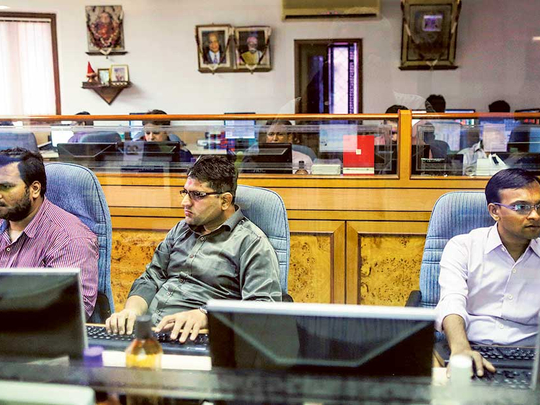
Dubai: With markets bracing for a US rate hike in December and a possible reversal of easy money policy from Europeand Central Bank and Bank of Japan, market experts feel that India would a defensive play in case of a global shock.
India, which is the fastest growing major economy, has been fundamentally driven by domestic demand and reforms, which is very much in control of the country, unlike other external factors. India’s main stock market index, Sensex, has gained 7 per cent so far in the year compared to 10 per cent gains in the MSCI Emerging market index. This also compares with a 4.60 per cent gain in the Dow Jones Industrial Average since January 1.
“The global macro risk is a global macro risk. It would impact every single asset class across the globe. We are a footnote in that story. India is actually a defensive play in that. Our relative ability to withstand a global storm is acknowledged quite well. We are in that sense a very defensive bet in a global macro shock scenario of reversal of easy money policy. and further tightening by the US Federal Reserve. India would actually outperform in that scenario,” Leo Puri, managing director at UTI Mutual Fund said.
Soledad Lopez, emerging market equity strategist at UBS Wealth Management concurred with UTI’s Puri.
“India is more defensive than the average emerging market, with higher exposure to health care and consumption. Its current account is also in a better position than it was three years ago, and it has the highest expected earnings growth in emerging markets. In our view, Indian equities should perform in line with emerging markets in a risk-off environment,” said Lopez.
Monsoon season
Even in current circumstances India is one of the better performing emerging markets.
The better-than-expected monsoon season is likely to boost the disposable income of rural Indians, who contribute to more than 70 per cent of the GDP. Also the new government has been very proactive with the reform process, trying to kick-start stalled projects. In road transport alone, the government has given contracts worth more than $52 billion (Dh190.8 billion) in the past two years.
“At this point the stars are aligned on three fronts. We have good macroeconomic which reflects in our fiscal deficit, current account deficit and foreign currency reserves, As a result of that our currency has been very stable. Secondly, we have a renewed commitment at the political level to the economic reform process, which is at a stepped up level, perhaps faster, deeper and longer than we saw in the last two decades,” Puri said.
These reforms are aimed at boosting the global capital flows. They are also aimed at freeing up sectors of the economy, which were under government control, and are aimed increasing India’s connectivity in terms of trade and capital markets.
Even the valuations have been fair.
Indian companies are trading at 17 times their expected earnings over the next 12 months. This is around half a standard deviation above their average for the past 10 years. The market is trading at a 48 per cent premium to the MSCI Emerging Market equity index. However, this is in line with the average premium of 56 per cent over the past three years. Given the earnings growth forecast, UBS feels that valuations are quite reasonable.
“At the tactical level, we are not worried about valuations. As it is a bright spot it’s been discovered by global asset managers, and valuations have not reached those frothy levels. And its not too late for investors to invest in India,” Puri said.
Diversification tool
Emirates NBD Asset Management, which has agreed with UTI Asset Management to come out with investment strategies including a Sharia compliant fund that will invest in Indian companies, feels that India can provide good diversification for investors in the UAE partly dependent on oil revenues, in a country which is a net importer of the commodity.
“Our clients, which are mostly institutional, look for diversification. They [are] not only geographic diversification, but also diversification within the markets. India not only offers diversification from country perspective. But the capital markets are themselves very diverse,” said Tareq Bin Hendi, chief executive officer, at Emirates NBD Asset Management.
UAE markets are very highly co-related to oil prices, but in India it is the opposite because it is a net importer of oil.












